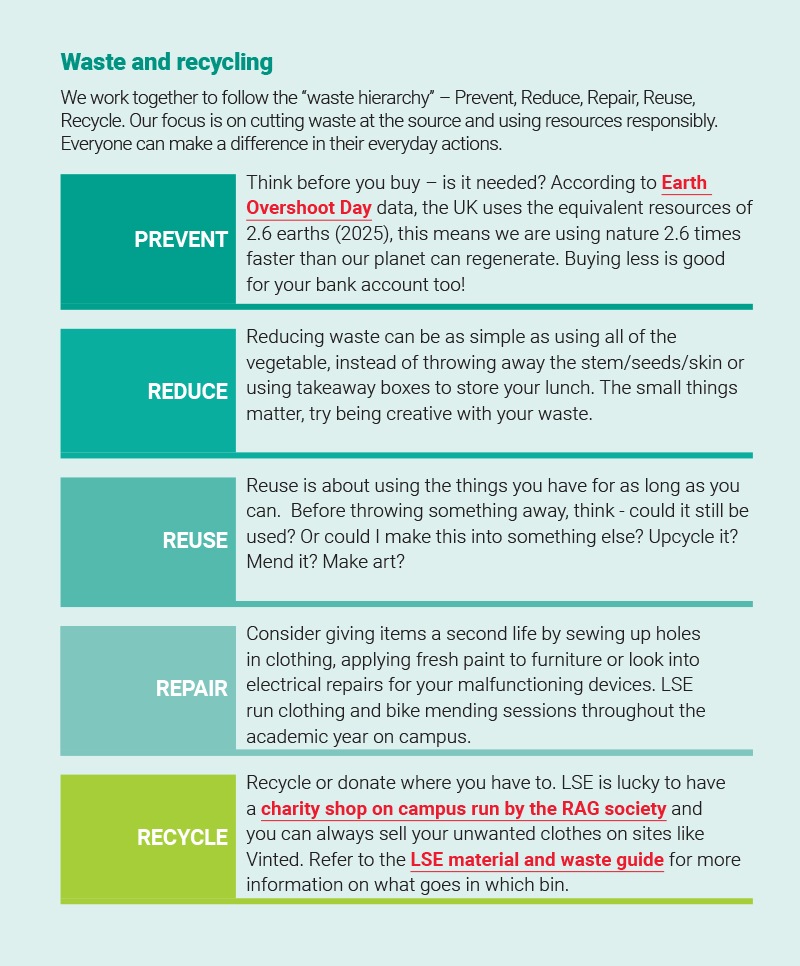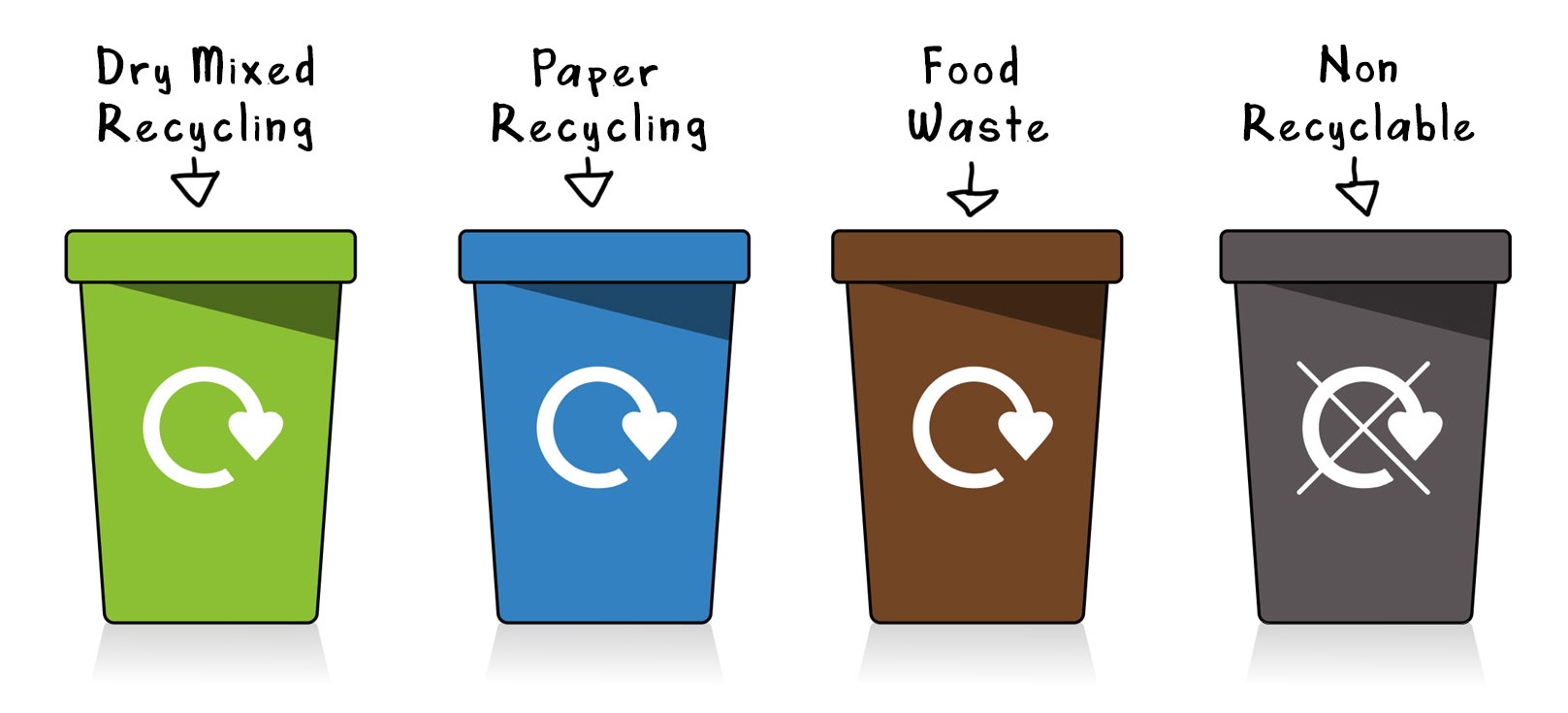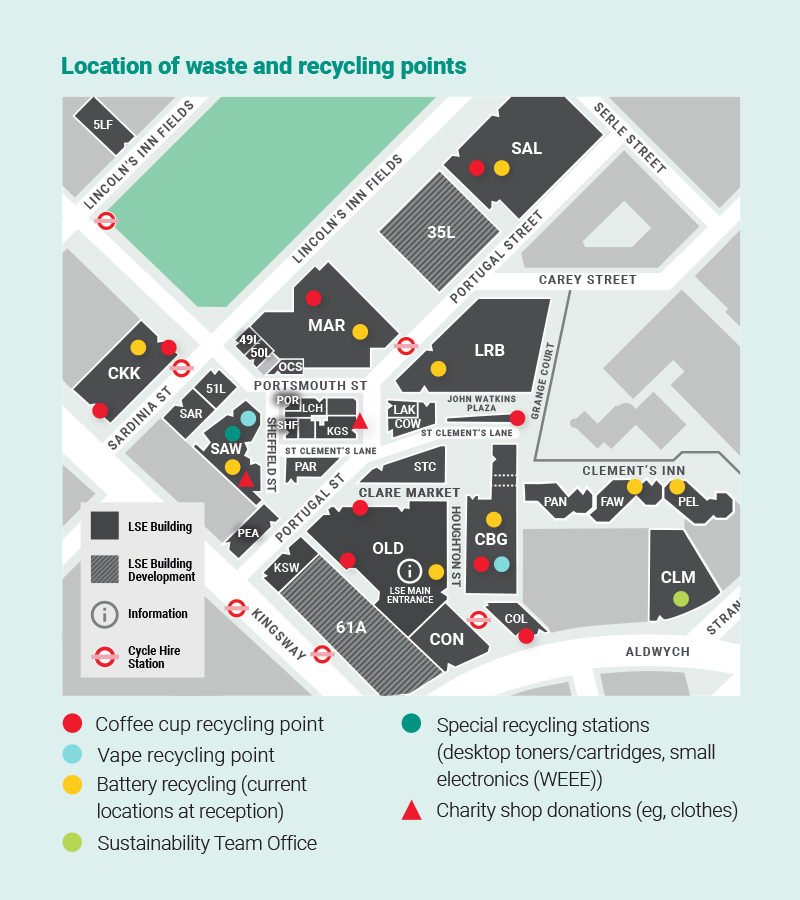In line with LSE’s Sustainability Policy, one of the key commitments of LSE's sustainability efforts is achieving zero waste to landfill each year. We are continuously striving to reduce waste and adopt circular economy principles of resource management through the waste hierarchy (below).
 Everyday waste and recycling at LSE
Everyday waste and recycling at LSE
Bins are located around campus, in kitchen areas, in corridors and in shared spaces in halls of residence. We are all have a shared responsibility for recycling correctly.
The bins are emptied by the cleaning teams daily and taken to the nearest external bin. Should a missed internal collection or issue need reporting on campus, please email: estates.fm@lse.ac.uk.
If in Halls, please contact the front of house team.
For waste-related enquiries, please contact Estates.Lse.Waste@lse.ac.uk

What goes in each bin at LSE?
- Plastic bottles
- Paper and card
- Drink cans and food tins
- Glass
- Drink and food cartons
- NO coffee cups, liquids, food, tissues as these can cause contamination.
We do have some specific paper-only bins on campus. If there is no blue bin, please use the green mixed recycling bin for your paper and card.
Please note, any card with embellishment or glitter is not able to be recycled.
- Any food scraps (fruit, vegetables, meat, dairy, bread…)
- Teabags
- Coffee grounds
- NO packaging
- Plastic bags, packaging and wrappers (if uncontaminated can also be recycled through the soft plastic recycling process, check your local supermarket)
- Crisp packets (can also be recycled through the soft plastic recycling process, check your local supermarket)
- Polystyrene
- Tissues, napkins and paper towels
- Pens and pencils
- Single-use hot drinks cups (if you cannot locate the special coffee cup recycling bins)
Cardboard should be flattened and left by any group of bins found inside.
This will be taken by the cleaning team to be baled.
Cardboard not on campus should be flattened and added to an external mixed recycling bin.
 Special recycling
Special recycling
Batteries are classed as hazardous waste, and should not be put in general waste.
See the campus map above for where to recycle batteries.
Small battery recycling tubs are located at building receptions for departmental recycling. Once full, they are to be transferred to the main collection point.
Current locations:
-
Receptions of: SAW, CKK, SAL, FAW, PEL, OLD, CBG.
-
At Halls of Residences, battery recycling can be found at reception.
On Campus: Porters will empty the boxes every 3 months. If the battery box becomes full before then, reception staff to log a request for porters to empty the containers Estates Portal (lse.ac.uk).
Halls: Halls reception staff to contact Valpak (03450 682 572) directly to arrange a collection from site.
Consider donating books (textbooks or otherwise) to local charity shops, including the LSESU Charity Shop on campus. You can also put books on Hazaar, Ebay, Depop etc.
What counts as confidential waste?
Confidential waste includes paper and other media containing information that should not be accessible to the general public, or that LSE has an obligation to protect, this includes but is not limited to:
• Personal contact information
• Sensitive reports and data
• Student and Staff signature, picture or private information
• Exam scripts and logistics
• Bank statements, credit card details and invoices
• CDs, DVDs, USBs etc.
Not confidential? Then put the papers into your nearest paper or dry mixed recycling bin.
How to dispose of confidential waste at LSE
- View the Confidential Waste Guidance.
- Complete a porter request form for confidential waste bags. Choose the ‘deliver confidential waste bags’ option. If you are disposing of CDs, ID cards, DVDs etc. the sacks need to have 'PLASTICS' or 'MEDIA' written on the sack.
- Close the bags once the bags are two-thirds full.
- Complete the porter request form for the bags to be collected by the porters, by choosing the ‘collect confidential waste’ option on the form. Remember sacks must be locked overnight in a cupboard or in a secure bin.
- If your project requires a large collection please contact estates.lse.waste@lse.ac.uk
Spotted our red bins on campus? They are for single-use hot drinks cups! Separate the remaining liquids, the lid and the cup in the respective compartments.
Try and remember your reusable hot drinks cup when visiting campus though. LSE Catering have a 25p levy on single-use cups and bottles, so you'll save 25p each time you bring a reusable cup to campus. LSE Catering outlets sell branded KeepCups for £10.75.
If you cannot locate your nearest red bin, please put your hot drinks cups in general waste, not mixed recycling.
Used coffee pod bags are provided by the coffee pod company e.g. Nespresso
When placing an order for new coffee capsules, request a collection and new bags for the used capsules at the same time. Request new bag delivery/collection from the Porters using the Estates Portal (lse.ac.uk) or drop the bag off at the post room. At time of arranging porter bag collection, departments must have arranged a collection with Nespresso, and included a note with details on the confirmed collection, along with contact details.
Alternatively, your team could purchase a capsule recycler (around £10), and then dispose of the cleaned pod in mixed recycling bins.
Small electricals e.g.,
-
Cables
-
Chargers
-
USB’s
-
Laptop adapters
- CDs, DVDs
There is a tub for small electricals at the Saw Swee Hock (SAW) reception desk.
Internal collection: Log a request for porters to empty the container on Estates Portal (lse.ac.uk) (select 'collect WEEE for disposal'). Students should email: estates.porters@lse.ac.uk.
These are classed as hazardous waste.
Internal container/bin: Small tub is available for departmental recycling in SAW. Reception staff in SAW to log a request for porters to collect the containers once full Estates Portal (lse.ac.uk).
A part of our 'Re-Love' campaign, you can find British Heart Foundation (BHF) Donation points in Saw Swee Hock Building (SAW) and Rosebery Halls of Residence all year around. There is a TRAID donation point at all LSE-managed halls of residence.
Hazaar: Students and staff can download Hazaar, an app-based marketplace, and by making an account with their LSE email address can buy and sell within the LSE community. There is no need for postage and packaging - just meet up at designated 'swap spots' on campus.
LSESU Charity Shop: Accepts donations to their student-run shop, located on Portugal Street. Any proceeds go to RAG charity partners.
Furniture for Reuse: Estates (Porters, Capital Development, Estates HelpDesk, Space Planning and Residences) should be given first preference of any items that can be kept and reused internally.
If no longer wanted by LSE, reuse companies can be used at a cost.
Broken furniture: The Porters will move, and store broken furniture in the internal storerooms. Request removal via the Estates Portal (lse.ac.uk). Once there is enough for a collection, the Porters will let the Environmental Manager know and they will organise a skip with our waste contractor.
- Aerosols
- Lightbulbs and fluorescent tubes
- Chemicals, eg. brake fluid or print toner
- Cleaning fluids
- Propane gas bottles
- Oil filled radiators
- Solvents
Staff: Request removal by Maintenance through Estates Portal (lse.ac.uk). It should not be moved by any other party.
- Fridges
- Freezers
- Dishwashers
- Microwaves
- Wood pallets
Contact porters via Estates Portal (lse.ac.uk).
Mattresses: Matress collection is organised by Halls staff. Each hall has their own storage e.g. a room or a cage. Mattresses need to be kept dry prior to collection. View LSE Material and Waste Guidance document for more in-depth information.
For furniture, see drop-down further up the page.
If you are unsure about an item or to report any issues with waste collection, please contact: sustainability.team@lse.ac.uk. Find out more about LSE’s approach to Waste and Resources management.
Practising Zero Waste
- Why not prepare your lunches in advance and bring to campus in reusable storage containers? This not only reduces packaging, but also saves money and generally can work out healthier than grab-and-go convenience food.
- It is easy to avoid using single-use cutlery, by having your own reusable set when you visit campus.
- Purchase your own reusable bottle/hot drinks cup and bring it with you so you avoid buying single-use bottles or hot drink cups.
- Bring tote bags with you or reuse plastic bags, so you never have to accept new bags.
Did you know 7 million disposable cups are used in the UK every day? Only 1 in every 400 get properly recycled, according to data in 2021.
- Soap and shampoo bars are compact, so they produce fewer emissions during transport than their liquid equivalents. They often have little (and recyclable) or no packaging compared to their plastic bottle counterparts. Lots of brands offer refill packs now too, which is a good option for reducing packaging waste.
- Reusable facial pads are machine washable and you can use them hundreds of times (e.g., to remove your makeup).
- Did you know menstrual products such as tampons and sanitary towels often contain plastics? Zero waste your periods by purchasing a menstrual cup or washable pads. They will also save so much money in the long run!
Wanting to make a difference during your time at LSE and interested in sustainability?
Here’s how:
- Take the Introduction to Sustainability at LSE module on Moodle.
- Subscribe to our monthly sustainability newsletter, Green Flash.
- Follow us on Instagram, TikTok, X (Twitter), and the LSE Student Hub: @SustainableLSE.
- Join one of our environmental societies! We have several to choose from, including Sustainable Futures Society, Beekeeping Society and the Circular Economy Society. Find out more here.
- Be proactive in our #SustainableLSE halls campaign, which is all about reducing energy and water consumption and improving recycling rates.
- Green Impact, our sustainability engagement programme, encourages teams to work to complete sustainable actions to help the School reduce their environmental impact. Email sustainability.team@lse.ac.uk to find out more about how you could get involved.
- Beekeeping and rooftop gardening on the Shaw Library roof terrace.